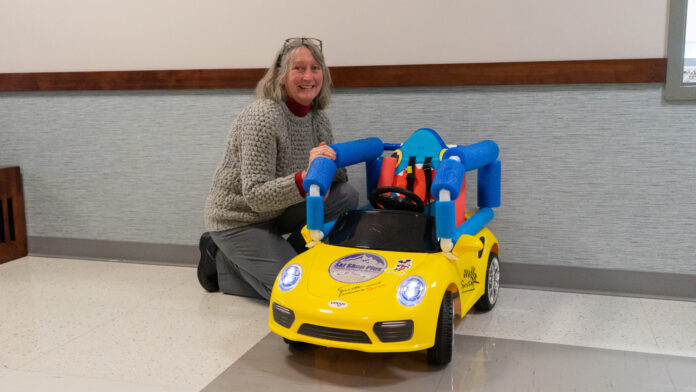
Cyndi Fuchs is an occupational therapist and an assistant professor in the occupational therapy department at the New England Institute of Technology.
Fuchs recently started a program at New England Tech called “Go Baby Go,” in which students designed modifications to toy cars for children who have physical disabilities that affect their mobility. She spoke with PBN about the program, its early impact and its future expansion.
PBN: How did the idea of the Go Baby Go program come about?
FUCHS: Rick Linet, representing the Go Baby Go program, contacted Dean Plowman, the department chair for engineering programs at New England Institute of Technology, to determine the university’s interest in participating in this unique program. The Go Baby Go program began at the University of Delaware and has now expanded, both nationally and globally. Mr. Linet presented the program to occupational therapy and engineering faculty. Everyone was excited to learn about the clinical benefits this program would offer children with mobility limitations here in Rhode Island, as well as the academic benefit to NEIT students.
PBN: How many students were involved in making these modified toy cars and approximately how long did it take to make each modification?
FUCHS: There were 10-12 students involved in the actual modifications, three from the occupational therapy assistant program, and the remaining students from the mechanical and electrical engineering departments. OTA students and faculty visited the children’s homes and met with them and their families to determine what their goals were along with the child’s capabilities. We took video of the children playing to observe their capabilities to determine their strengths and needs, their best point of control and their seating requirements.
The OTA students then showed the videos to the engineering students and faculty, and they all brainstormed to determine the modification requirements specific to each child. Faculty member Jen Hurley from the mechanical engineering program led the students in constructing the seating and positioning adaptations, while two electrical engineering faculty members, Tony Coelho and Joe Gundel, designed the electrical modifications.
The electrical engineering students met throughout the week with faculty to work on the electrical controls. OTA and engineering students met at least once a week for about eight weeks to work on the car modifications.
PBN: Can you describe one particular modification that was unique?
FUCHS: The children needed the ability to control both the movement and steering of the cars with their hands. One child would do best with a joystick control; however, it was determined that the other two children would do well with a different method to make the car go and control the speed using the car’s steering wheel.
Mr. Coelho and Mr. Gundel designed a sensor system that would be activated by the children pushing down on a button with their thumb as they steered the car. A tiny pad was built into a button that they fabricated with a 3D printer and then set it into the steering wheel. The amount of pressure the child used would control the speed of the car.
The knowledge displayed by our engineering faculty was amazing. They encountered a few glitches along the way but continued to design, experiment and redesign the controls until they worked perfectly.
The students assisted the children with the operation of their car at the Build Day presentation held on Nov. 17 at NEIT. It didn’t take long for the happy children to be off on their own with a sense of independence that they had not experienced before.
PBN: What was the response like from the families who benefited from these modified toy cars?
FUCHS: The families were ecstatic. The joy on the children’s, parents’ and grandparents’ faces was priceless. After the children drove the cars at the Build Day around a colorful racetrack built by NEIT students, it was determined that a few modifications were needed before the cars could be delivered. All three children received their cars during the week of Dec. 9.
PBN: Do you plan to continue and expand this program going forward?
FUCHS: Our students are excited and already gearing up for our next Build Day scheduled for the spring of 2020. New England Tech’s Go Baby Go team plans to build four to five cars, and we already have families applying for this unique opportunity for their child. Mr. Linet continues his search for local sponsors who can help improve the lives of these deserving children. NEIT’s occupational therapy and engineering faculty and students stand ready to assist the children as well.
James Bessette is the PBN special projects editor and covers the nonprofit and education sectors. He can be reached at Bessette@PBN.com.












